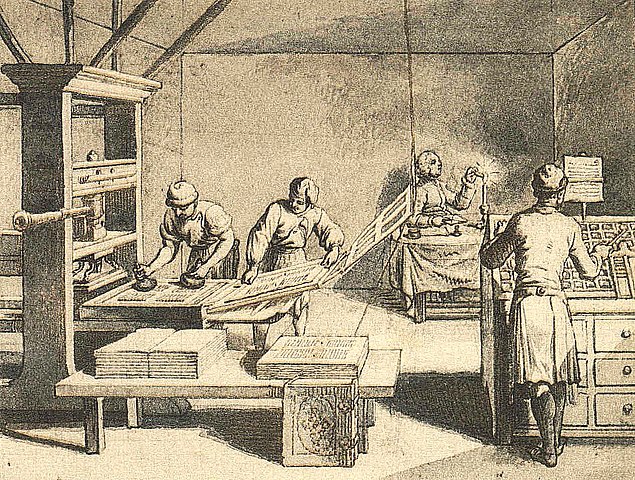
In the 1440s, Johannes Gutenberg invented the printing press and changed the world. It is not very often where you can say that an invention caused such enormous ripples that without it, we wouldn’t be where we are today. The wheel seems an obvious example. The printing press made the spread of information, knowledge, discoveries, and ideas so much easier, faster, and cheaper. Literacy rates soared after the printing press was invented. Scientific discoveries snowballed because people could now work off information that others had discovered without having to meet them or to find people who had met them. Gutenberg sparked an Information Revolution. It is no coincidence that the Industrial Revolution came so soon after the invention of the printing press. If you plot the speed of scientific discoveries on a map, then it is a hockey stick and the point where it starts to shoot up is the invention of the printing press. Gutenberg’s printing press has been judged as the most important invention of all time by several groups and publications, including Time. You could argue that if Gutenberg hadn’t invented it then someone else would have and you might be right, but he did, and they didn’t.
Johannes Gutenberg was born in Mainz, which is in modern Germany, in possibly 1400. Not very much is known about his childhood or his education until he pops up in Strasbourg, France, in 1434. He appears to have become a goldsmith, a profession that will be very useful when he starts to make his printing press. He comes up with the ideas behind his press in Strasbourg and then moves back to Mainz to work on it. He borrows a lot of money from different people to get it running, a problem that will come back to haunt him later, and has the press up and running by at least 1450. He printed a German poem in 1450, which is possibly the first thing ever printed on his press. He started printing different things commercially, including indulgencies for the Catholic church. (An indulgence is a money-making scheme the Catholic church came up with. An indulgence was a way to reduce the amount of punishment you needed to go through to be redeemed of sins and you could buy them. It is slightly ironic that the Catholic church used the printing press to mass produce indulgences which raked in a fortune, while at the same time Martin Luther used the printing press to start his protestant revolution.) He began work on his famous bibles in 1455 and ultimately produced 180 copies. He was sued for the money he had borrowed in 1456 and was forced into bankruptcy. He carried on printing and refining his press and he died in 1468. His grave has been lost.
So, why is his invention so important? Johannes Gutenberg didn’t invent movable type. That was invented in China several hundred years earlier. Early printing was made on blocks where the image or the text was carved. It was good quality, but each block had to be carved, which took a long time. In 1000 AD, Bi Sheng came up with characters that were carved out of clay and placed in an iron frame. Clay is not a great material because it absorbs the ink and becomes damaged with repeated use. In 1297, Wang Chen came up with wooden movable type. Each character was carved out of a wooden block and could be set into a frame. The main problem and probably the reason why this didn’t take off in China is that China has so many different characters. To write a book would require thousands of different carved blocks. English has the advantage that all of the letters, numbers, and punctuation can be reduced down to the number of keys you have on the keyboard in front of you: approximately 50.
Johannes Gutenberg used his goldsmithing knowledge to come up with a way of casting the characters for his movable type. It is unlikely that he had any knowledge of the movable type made in China. He used metal because it was stronger than wood, easier to make, and didn’t absorb any of the ink. He made molds and poured molten lead into them. The characters were all uniform and he could arrange all of the characters to print a double page of a book very quickly.
Johannes Gutenberg came up with two other things as well. The first was obviously the press itself. He adapted a press that was used to make olive oil. He had to remake the paper because it needed to be of a standard thickness for the press to work. The paper also needed to be slightly damp for the ink to stick properly. The second thing he came up with was a new kind of ink. Existing ink wouldn’t stick properly to the page and smudged easily. He made his ink by mixing linseed oil and lampblack, which is a kind of soot. It was the perfect consistency and stuck to the paper very well, as can be seen by looking at his bibles which still exist.
The printing press was improved upon pretty much as soon as Gutenberg had invented it and it can be said that many of the people who improved upon it were better printers and typographers than Gutenberg, but without his first step, they would have had nothing to improve upon. Without Johannes Gutenberg, I probably wouldn’t be able to type this today. And this is what I learned today.
Image By Daniel Nikolaus Chodowiecki – DANIEL CHODOWIECKI 62 bisher unveröffentlichte Handzeichnungen zu dem Elementarwerk von Johann Bernhard Basedow. Mit einem Vorworte von Max von Boehn. Voigtländer-Tetzner, Frankfurt am Main 1922. (self scanned from book), Public Domain, https://commons.wikimedia.org/w/index.php?curid=17927966
Sources
https://www.history.com/topics/inventions/printing-press
https://en.wikipedia.org/wiki/Johannes_Gutenberg
https://en.wikipedia.org/wiki/Indulgence
https://en.wikipedia.org/wiki/Mainz
https://en.wikipedia.org/wiki/Global_spread_of_the_printing_press
https://teachdemocracy.org/online-lessons/bill-of-rights-in-action/bria-24-3-b

Pingback: Geoffrey Chaucer – the Father of English Literature - I Learned This Today